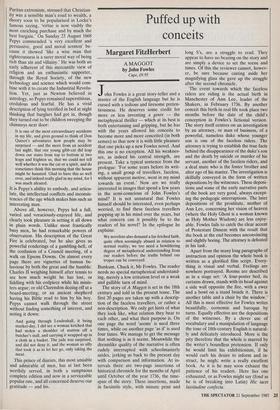Puffed up with conceits
Margaret FitzHerbert
A MAGGOT by John Fowles
Cape, f9.95
John Fowles is a great story-teller and a master of the English language but he is cursed with a tedious and tiresome preten- tiousness. He deserves some credit for more or less inventing a genre — the metaphysical thriller — which at its best is both entertaining and gripping, but he has with the years allowed his conceits to become more and more conceited (in both senses) so that now it is with little pleasure that one picks up a new Fowles novel. And this one is no exception. All his weaknes- ses, as indeed his central strength, are present. Take a typical sentence from the prologue: 'For some years before its writ- ing, a small group of travellers, faceless, without apparent motive, went in my mind towards an event.' Now are we really interested in images that spend a few years in the semi-conscious of John Fowles's mind? It is not unnatural that Fowles himself should be interested, even perhaps worried, to find these faceless travellers popping up in his mind over the years, but what concern can it possibly be to the readers of his novel? In the epilogue he explains: We novelists also demand a far-fetched faith, quite often seemingly absurd in relation to normal reality; we too need a bewildering degree of metaphorical understanding from our readers before the truths behind our tropes can be conveyed.
Bunkum. Chuck it, Mr Fowles. The reader needs no special metaphorical understand- ing, merely a low irritation level or a weak and gullible turn of mind.
The story of A Maggot is set in the 18th century and told in the present tense. The first 20 pages are taken up with a descrip- tion of the faceless travellers, or rather a non-description. We only get hints of what they look like, what relation they bear to each other, and what their purpose is. On one page the word 'seems' is used three times, while on another page 'as if' is used four times. We manage to get the message that nothing is as it seems. Meanwhile the dreamlike quality of the narrative is often rudely interrupted with schoolmasterly asides, jerking us back to the present day with comparison and information. At in- tervals there are two-page insertions of historical chronicle for the months of April until October of the year 1736, the time- span of the story. These insertions, made in facsimile style, with minute print and long S's, are a struggle to read. They appear to have no bearing on the story and are simply a device to set the scene and times. Of this the reviewer cannot, howev- er, be sure because casting aside her magnifying glass she gave up the struggle after the second chronicle.
The event towards which the faceless riders are riding is the actual birth in Manchester of Ann Lee, leader of the Shakers, in February 1736. By another conceit this birth in real life took place two months before the date of the child's conception in Fowles's fictional version. The story itself centres on an investigation by an attorney, or man of business, of a powerful, nameless duke whose younger son is one of the faceless riders. The attorney is trying to establish the true facts behind the disappearance of the duke's son and the death by suicide or murder of his servant, another of the faceless riders, and a deaf mute who is the foster brother and alter ego of his master. The investigation is skilfully conveyed in the form of written depositions by the witnesses. These deposi- tions and some of the early narrative parts of the book are very good, always except- ing the pedagogic interruptions. The later depositions of the prostitute, mother of Ann Lee, concerning her vision of heaven (where the Holy Ghost is a woman known as Holy Mother Wisdom) are less enjoy- able. Fowles fails to catch the clear accent of Protestant Dissent with the result that the book at the end becomes unconvincing and slightly boring. The attorney is defeated in his task.
Apart from the many long paragraphs of instruction and opinion the whole book is written as a glorified film script. Every- thing is visual and verbal. Feelings are nowhere portrayed. Rooms are described as in a stage set: 'A four-poster bed, its curtains drawn, stands with its head against a side wall opposite the fire, with a ewer and a bowl on a stand beside it. There is another table and a chair by the window.' All this is most effective for Fowles writes beautifully, economic and baroque by turns. Equally effective are the depositions of the witnesses. By a clever use of vocabulary and a manipulation of language the tone of 18th-century English is natural- ly and delicately introduced. More is the pity therefore that the whole is marred by the writer's boundless pretension. If only he would limit his exhibitionism, if he would curb his desire to inform and in- struct, he might write a really excellent book. As it is he may soon exhaust the patience of his readers. Here lies one exhausted, or as Fowles might say (fond as he is of breaking into Latin) Hic iacer lassitudine confecta.














































 Previous page
Previous page